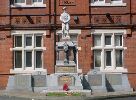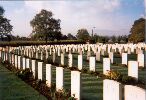
Newton-le-Willows and
Earlestown War Memorial

| OTHER WARS |
 |
Newton-le-Willows andEarlestown War Memorial |
 |
| The
Great War Roll of Honour |
|||||||||||||||||||||||||
Captain H. Whalley-Kelly, in his book “Ich Dien –
The Prince of Wales’s Volunteers”, gives the following account:
“It is not possible to make a thrilling story out of the drab monotony
of the daily round of work carried out by battalions employed as Pioneers. It
has been truly said that modern war consists of long periods of intense boredom
punctuated by moments of intense fear, and to no phase does this epigram apply
with more force than to the weeks, and sometimes months, spent by Pioneer battalions
in carrying out, usually at night the multitudinous tasks called for by the
conditions of static warfare. Like so many things in war, as in life, the existence
of a Pioneer battalion was a paradox; on one hand the daily routine of heavy
manual labour in wet and muddy trenches, often under fire; the carrying parties,
with men stumbling blindly forward over the shell-pocked ground; the wiring
parties in No Man's Land, humping "knife-rests" and crouching low
every time the enemy's flares lit up the scene of desolation round about; all
carried out in cold blood, the men frequently soaked to the skin, with none
of the excitement of actual combat to stimulate their aching muscles. On the
other hand, the discipline and devotion to duty required to overcome the laxness
in turnout and soldierly bearing which was bound to develop under such conditions,
and to maintain the cohesion and high military qualities demanded by the very
nature of the work itself. To the everlasting credit of the 4th Battalion all
ranks rose supreme above the soul-destroying elements of their allotted role,
and never once was there any relaxation of the very high standard of their work
in their varied tasks, nor faltering in the strong Regimental spirit that animated
officers and men alike."